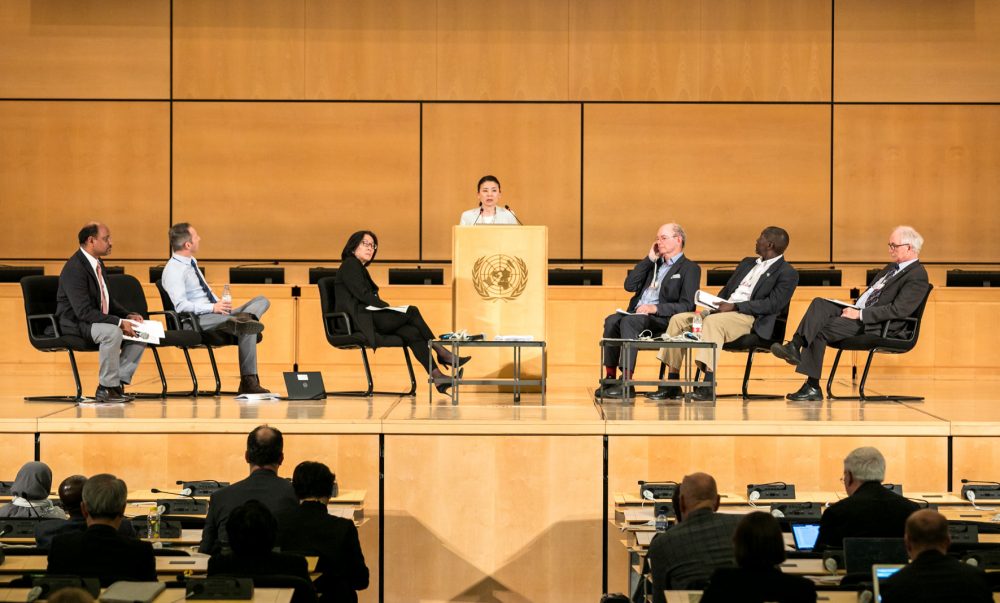Global Platform for DRR 2019| Geneva, Switzerland | May 13-17, 2019
APRU Multi-Hazards Program Director, Dr. Takako Izumi of Tohuku University announced new publication and journal at the Global Platform for Disaster Risk Reduction (DRR) 2019. The launch of the 30 Innovations for DRR, the newest Multi-Hazards Program’s publication took place during the Innovation and DRR session of the Global Platform for DRR 2019. A panel discussion filled to capacity consisted of experts from Tohoku University International Research Institute of Disaster Science (IRIDeS), Keio University, The University of Tokyo, United Nations University, and CWS Japan. The APRU-IRIDeS Multi-Hazards program received valuable feedback from DRR experts and practitioners.
“30 Innovations for DRR” collects thirty innovative products and approaches considered to be extremely effective in reducing disaster risks.
It includes the results of a survey which collected input from APRU multi-hazards experts, determining the top three DRR innovations are considered to be the most effective by academia, NGOs, international organizations, governments, and the private sector.
DRR is becoming an ever more pressing task, as illustrated by the world in 2018 facing a seemingly unending cycle of disasters, such as heatwaves, droughts, floods, typhoons, earthquakes, tsunami, and volcanic eruptions.
“The need for increased application of innovation and technology for DRR has never been greater, but we have found that many relevant research results and findings are either not shared, inaccessible, or barely recognized by actual users and practitioners,” said Izumi.
“To improve this situation and create a mutually cooperative environment, we developed ‘30 Innovations for DRR’ to be used at training sessions, seminars, and classes,” she added.
In addition to launching the publication, a new journal, Progress in Disaster Science, was presented at the Science and Policy Forum for the Implementation of Sendai Framework for DRR. Ms. Mami Mizutori, the UN Special Representative of the Secretary-General for DRR, presented as part of the panel which was co-organized by the UNISDR Science Technology Advisory Groups (STAG), the International Science Council (ISC), and Integrated Research on Disaster Risk (IRDR).
Progress in Disaster Science is an open-access journal that aims to report on the substantial progress in disaster research field for the purpose of better integrating disaster research and policy.
Among the APRU Multi-Hazards Program’s key objectives, a priority is to fill the current gap in knowledge and application of new DRR technologies and commit collectively to enhanced collaboration for an integrated science approach to DRR.
The results of the discussions will feed into the UN’s High-Level Political Forum, the High-level Dialogue on Financing for Development, and the UN Climate Summit under the auspices of the UN General Assembly in September, as well as other critical global and regional events with the aim to link the 2030 Agenda and their respective scientific bases closer together.
“The increased frequency and intensity of extreme events requires us to accelerate our DRR efforts and create innovative solutions to minimize the damage and wide-ranging secondary impacts of future events,” said Christopher Tremewan, APRU’s Secretary-General.
“30 Innovations for DRR” not only feature high-tech solutions but also provides contextual approaches, traditional ideas, and social science insights, offering recommendations that do not require large budgets or the use of advanced technology,” he added.
With the success of “30 DRR Innovations”, the APRU Multi-Hazards Program plans to publish a second volume to be launched at the Asian Ministerial Conference for DRR in June 2020 to be held in Brisbane in Australia.
The publication has been downloaded from the UNU library for over 800 times since it was published online in March.
The Global Platform for Disaster Risk Reduction is a biennial multi-stakeholder forum established by the UN General Assembly to review progress, share knowledge and discuss the latest developments and trends in reducing disaster risk.

